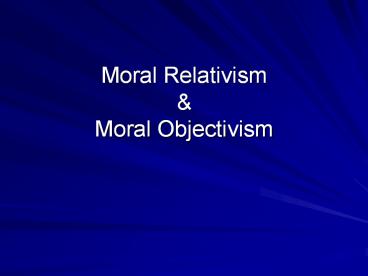Moral Relativism - PowerPoint PPT Presentation
1 / 11
Title: Moral Relativism
1
Moral RelativismMoral Objectivism
2
Moral Relativism
- This is a view held by Ruth Benedict, Melville
Herskovits, and others. - When we observe a variety of cultures, we see
different values and practices. - Therefore, what is right is purely dependent upon
our culture. - There is no objective way to say any act is right
or wrong.
3
The Claim of Moral Objectivism
- Pojman disagrees he sees flaws in the claims of
moral relativists, and he makes claims that there
are some objective moral values. - Note We need to distinguish in our minds the
difference between a person as bad because he/she
does something, and asserting that the act is
good or bad. For example, we would ordinarily not
judge a16-month old as bad who tries to poke a
stick into his mothers eye, but we would almost
certainly try to teach the child that the act is
not something he/she should do.
4
Pojmans Counter-Arguments
- 1) Just because cultures are different (diversity
theory), that does not mean they should be
different (dependency theory). - 2) There is no logical and precise way to decide
what is a culture. Is it a nation, church, state,
family, geographical location, etc.? Why not one
person? - 3) Polls show most Americans approve birth
control and capital punishment, but Catholics do
not. Which culture trumps the others?
5
Pojmans Counter-Arguments
- 4) Herskovits argues for moral relativism, but
then contradicts himself by saying tolerance is
the one value that should be universal. If a
culture says tolerance is wrong, moral
relativists must say that is okay. - 5) Moral relativism implies that reformers are
always wrong, e.g., Christ was wrong in
challenging traditional Jewish views, we were
wrong to free the slaves and let women vote.
6
Pojmans Counter-Arguments
- 6) Perhaps diverse moral practices have an
underlying similarity, e.g., cultures that oppose
capital punishment and those that favor it both
say they hold their view because life is valuable
and sacred. - 7) Although most of us do have tolerance for many
different moral practices, we generally agree
that it is objectively wrong for someone to kill
an innocent person against his or her will. If
there is, in fact, one objective moral value,
then moral relativism is not correct.
7
Pojmans Counter-Arguments
- 8) We have no difficulty asserting that other
cultures can be wrong about scientific facts.
Isnt it a logical conclusion that cultures,
including our own, can be wrong about moral
claims? Isnt it possible, for example, that the
practice of slavery was objectively not as good
as the moral practice of treating all humans
equally.
8
Pojmans Arguments for a Limited Moral Objectivism
- Pojman first claims that It is morally wrong to
torture people for the fun of it is an
objectively true principle. He claims it makes
more sense to say that a culture that holds the
opposing view is wrong or irrational than to say
torturing people for fun is morally good if the
culture says it is.
9
Pojmans Arguments for a Limited Moral Objectivism
- Moral goodness has something to do with the
ameliorating of suffering, the resolution of
conflict, and the promotion of human
flourishing. (187)
10
Pojmans Arguments for a Limited Moral Objectivism
- Moral principles are functions of human needs
and interests . . . . - Some moral principles will promote human
interests and meet human needs better than
others. - Those moral principles that meet human needs
better are objectively valid. - . . . There is an objectively valid set of
moral principles. (185)
11
Pojmans Arguments for a Limited Moral Objectivism
- The claim that there objective moral values does
not require or depend on a belief in God or a
religion. - There may be competing sets of proposed objective
moral principles. - The objective moral principles may not be real,
that is, they may not have a separate existence
apart from human needs, and they may not be
absolute.































